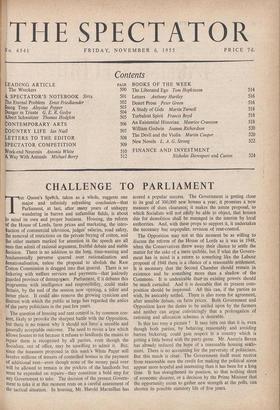CHALLENGE TO PARLIAMENT
The question of housing and rent control is, by common con- sent, likely to provoke the sharpest battle with the Opposition, but there is no reason why it should not have" a sensible and generally acceptable outcome. The need to revise a law which allows houses to rot because it refuses to landlords the means to repair them is recognised by all parties, even though the Socialists, out of office, may be unwilling to admit it. But, since the measures proposed in this week's White Paper will involve millions of tenants of controlled houses in the payment of additional rent—even though none of the money paid over Will be allowed to remain in the pockets of the landlords but must be expended on repairs—they constitute a bold step for any Government to take. The decision of the present Govern- ment to take it at this moment rests on a careful assessment of the tactical situation. In housing, Mr. Harold Macmillan has scored a popular success. The Government is getting close to its goal of 300,000 new houses a year; it promises a 'new measure of slum clearance; it makes the astute proposal, to which Socialists will not easily be able to object, that houses due for demolition shall be managed in the interim by local authorities. And, with these props to support it, it undertakes the necessary but unpopular, revision of rent-control.
The Opposition may not at this moment be as willing to discuss the reform of the House of Lords as it was in 1948, when the Conservatives threw away their chance to settle the matter for the sake of a mere quibble, but if what the Govern- ment has in mind is a return to something like the Labour proposal of 1948 there is a chance of a reasonable settlement. It is necessary that the Second Chamber should remain in existence and be something more than a shadow of the Commons. It is undesirable that• its existing powers should be much curtailed. And it is desirable that its present com- position should be improved. All this can, if the parties so wish, be amicably settled. There is also room for agreement, after sensible debate, on farm prices. Both Government and Opposition have the desire to be smiled upon by the farmers and neither can argue convincingly that a prolongation of rationing and allocation schemes is desirable.
Is this too rosy a picture ? It may turn out that it is, even though both parties, by behaving reasonably and avoiding barren bickering, could gain respect in a country which is getting a little bored with the party game. Mr. Aneurin Bevan has already reduced the hope of a reasonable housing settle- ment. There is no accounting for the perversity of politicians. But this much is clear. The Government itself must receive from reasonable men the credit for making the political scene appear more hopeful and interesting than it has been for a long time. It has strengthened its position, so that 'nothing short of economic disaster, or a decision by the Prime Minister that the opportunity exists to gather new strength at the polls, can shorten its possible statutory life of five years.


































 Previous page
Previous page